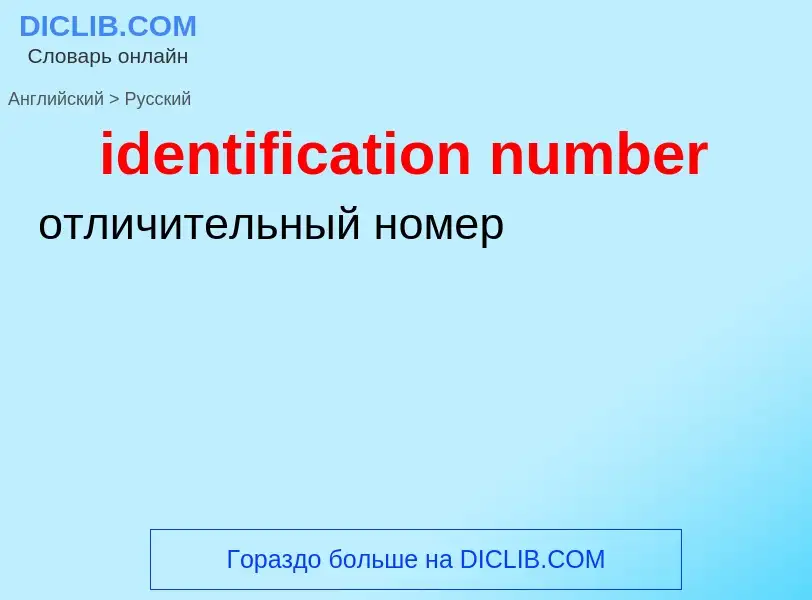Перевод и анализ слов искусственным интеллектом ChatGPT
На этой странице Вы можете получить подробный анализ слова или словосочетания, произведенный с помощью лучшей на сегодняшний день технологии искусственного интеллекта:
- как употребляется слово
- частота употребления
- используется оно чаще в устной или письменной речи
- варианты перевода слова
- примеры употребления (несколько фраз с переводом)
- этимология
identification number - перевод на русский
2) кодовый номер нанимателя
Википедия

An identifier is a name that identifies (that is, labels the identity of) either a unique object or a unique class of objects, where the "object" or class may be an idea, physical countable object (or class thereof), or physical noncountable substance (or class thereof). The abbreviation Id often refers to identity, identification (the process of identifying), or an identifier (that is, an instance of identification). An identifier may be a word, number, letter, symbol, or any combination of those.
The words, numbers, letters, or symbols may follow an encoding system (wherein letters, digits, words, or symbols stand for [represent] ideas or longer names) or they may simply be arbitrary. When an identifier follows an encoding system, it is often referred to as a code or id code. For instance the ISO/IEC 11179 metadata registry standard defines a code as system of valid symbols that substitute for longer values in contrast to identifiers without symbolic meaning. Identifiers that do not follow any encoding scheme are often said to be arbitrary Ids; they are arbitrarily assigned and have no greater meaning. (Sometimes identifiers are called "codes" even when they are actually arbitrary, whether because the speaker believes that they have deeper meaning or simply because they are speaking casually and imprecisely.)
The unique identifier (UID) is an identifier that refers to only one instance—only one particular object in the universe. A part number is an identifier, but it is not a unique identifier—for that, a serial number is needed, to identify each instance of the part design. Thus the identifier "Model T" identifies the class (model) of automobiles that Ford's Model T comprises; whereas the unique identifier "Model T Serial Number 159,862" identifies one specific member of that class—that is, one particular Model T car, owned by one specific person.
The concepts of name and identifier are denotatively equal, and the terms are thus denotatively synonymous; but they are not always connotatively synonymous, because code names and Id numbers are often connotatively distinguished from names in the sense of traditional natural language naming. For example, both "Jamie Zawinski" and "Netscape employee number 20" are identifiers for the same specific human being; but normal English-language connotation may consider "Jamie Zawinski" a "name" and not an "identifier", whereas it considers "Netscape employee number 20" an "identifier" but not a "name." This is an emic indistinction rather than an etic one.

![motor vehicles]]. motor vehicles]].](https://commons.wikimedia.org/wiki/Special:FilePath/4373 Russian license plate Toyota car.jpg?width=200)
